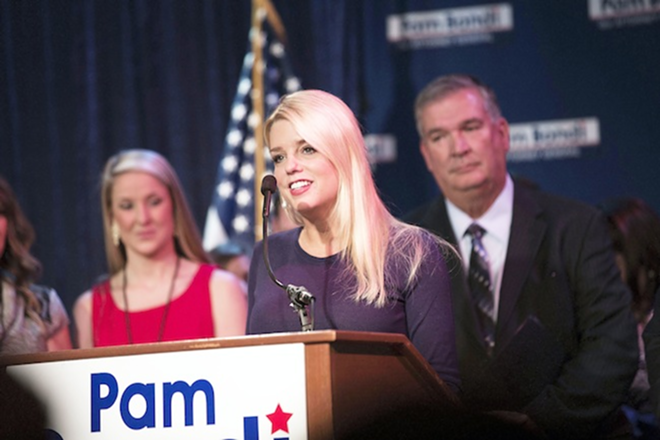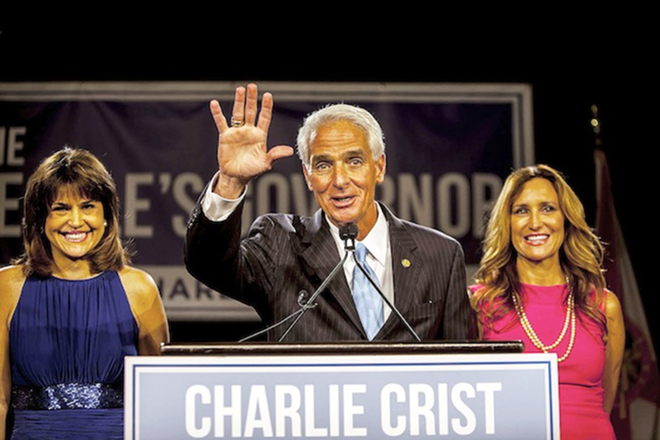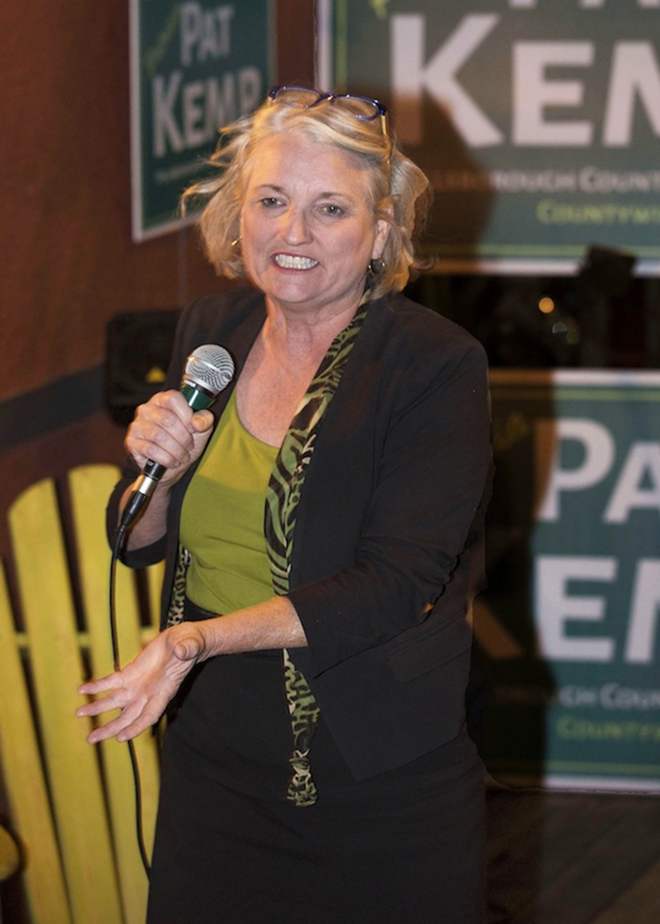As the clock ticked past 10 p.m. on Tuesday night inside the cavernous ballroom at the Vinoy Renaissance Hotel in St. Petersburg, a certain déjà vu took over the room. Just like the scene four years earlier at the Waterside Marriott Hotel in Tampa, when the exuberance of Alex Sink and her supporters at an apparent victory over Rick Scott was slowly turning to panic, or worse, resignation, Florida Democrats were again on the losing end of an incredibly important and divisive gubernatorial election.
And for Bay area progressives, Tuesday night was almost a complete wipeout.
Rail, a loser. Medical pot went down as well, thanks to the high bar for passage set by Republican state legislators last decade. And now the Democrats’ best hope to get one of their own into the governor’s mansion for the first time in two decades, the former Republican governor, Charlie Crist, was losing to Rick Scott.
Sink/Scott was closer
The only hope lay, as it did four years ago, in the late-reporting Democrat-rich counties of South Florida, where possibly, just possibly, a miracle existed that could get Crist over the top to edge out the incumbent.
That didn’t happen. It took Charlie Crist another 75 minutes to concede, which he did, briefly and somberly.
Exit polling conducted by Edison Research showed that with all of the talk about changing demographics, whites are in the majority in Florida, and they came out in overwhelming numbers for Governor Scott, whereas Crist cleaned up with black and Latino voters, who abandoned Scott to the tune of nearly a dozen percentage points compared to 2010. Scott also lost support among independents, but retained enough to get him elected relatively comfortably in a race which many pundits had predicted would end up in a recount.
But the exit polls also showed something much simpler: the economy in Florida has improved in the last four years, and whether or not that’s attributable to Rick Scott’s leadership, a majority of Floridians didn’t want to change that leadership. Though Crist responded honestly that he’d had little control over the financial disaster that swept the nation in 2008, it still occurred under his watch, while Scott was able to enjoy the fruits of the recovery.
Could this possibly be the lowest moment for Florida Democrats in a series of low moments? It could very well be, when you consider that the already conservative Florida House of Representatives will lean even further to the right, the GOP winning a supermajority by retaining two House seats while flipping six Democrat-held seats in the I-4 corridor. Those included Palm Harbor Representative Carl Zimmermann and Tampa’s Mark Danish, who both lost re-election bids. But St. Petersburg attorney Dwight Dudley was able to hold on rather easily in the extremely unsavory battle against Bill Young in HD68.
Outgoing House Speaker Will Weatherford called the results “a validation of the policies we’ve been fighting for the last several years.” The last time the GOP had a supermajority, after the 2010 election, they went hard right, passing bills tightening restrictions on abortions, expanding gun rights, and making it harder for people to collect on property insurance claims.
Sound-bitten
Of course, medical marijuana was hardly “a loser” if you believe in democracy. A very solid 57 percent of Floridians went to the polls and ignored the naysayers who said it would ruin the state (one GOP legislator, Tampa state Representative Dana Young, even pointed to the recent rash of wrong-way drivers on Tampa Bay interstates as a reason to vote against the measure).
Other medical pot supporters weren’t so sanguine.
“It’s because of voter turnout and miseducation and propaganda,” bellowed Chris Cano, executive director of Central Florida NORML (who lost in his bid to join the Water & Soil Conservation committee in Hillsborough County). “I believe as Americans we’ve lost our ability to think independently these days, we think in soundbites, we think in what cable news tells us, we believe in what negative commercials say. That’s why negative commercials work so well in political campaigns these days, because people will believe it. People ask me all the time about this candidate or that candidate — is this true, is this not true. The fact of the matter is that it’s just misinformation and propaganda and the more money you have to spread it, it works. “
Greenlight, red light
Another huge disappointment for much of the Tampa Bay area establishment was the resounding defeat of the Greenlight Pinellas measure, which, four years after Hillsborough’s transit-vote debacle, lost by an even worse margin, 62-38 percent.
“I think the No Tax for Tracks people and others did a very effective job,” said Eckerd College political science professor Tony Brunello. “I also think the passion level for Greenlight was different. People who voted for Greenlight saw it as reasonable: ‘I’m willing to pay for more taxes, we need a sustainable plan.’ It’s about their view of a public good. ‘We can’t afford this on or our own, it’s not going to get done any other way, even if it doesn’t work out ideally, I’m willing to take that risk.’
“Well, that’s not a passionate thing, that’s sort of a common sense or practical sort of calculation on the part of people willing to increase their taxes. People who vote for No Tax for Tracks, it’s [about] ‘raising my taxes to redistribute that money to people who are less deserving than the people who originally earned the money themselves.’ It’s a moral issue.”
Although PSTA chair Brad Miller will undoubtedly be the subject of much criticism for the transit agency’s unforced errors in trying to push the plan forward, some blame will undoubtedly be directed at Stuart Rogel and the Tampa Bay Partnership, which was heavily involved in pushing both the Hillsborough and Pinellas transit initiatives. The quality of Yes on Greenlight’s commercials has become an immediate punching bag as well.
Ray Chiaramonte, executive director of the Hillsborough County MPO, speculated days before the Greenlight vote that it was important, if the measure lost, that the vote be closer than Hillsborough’s because it would say “we’re going in the right direction.” He mentioned that it took Phoenix three times before it passed a similar measure.
Mayor Bob Buckhorn, who is one of the most important players in trying to get Hillsborough County to pass a transit tax in 2016, told the Tampa Bay Times, “We’re going to make the case to the voters in Hillsborough County, which I think are far more progressive, far more inclined to believe that our future is better with a robust transportation system.”
But it could be argued that Hillsborough is not more progressive than Pinellas.
Local & global
The biggest stunner of all local races occurred in the Hillsborough County School Board District 2 race, where 64-year-old private school owner Sally Harris defeated establishment favorite Michelle Shimberg.
“I’m in shock,” Harris told the Tampa Tribune, and she wasn’t the only one.
Meanwhile, April Griffin could proudly proclaim that her sometimes confrontational stance toward Superintendent MaryEllen Elia had been validated by the voters, as she easily crushed Valrico attorney Dipa Shah by a 65-35 percent margin.
And Melissa Snively, the owner of an insurance agency and former Brandon Chamber of Commerce chairwoman, knocked out Christian conservative Terry Kemple, who again failed to gain a majority at the ballot box.
In Pinellas County, Democrats could smile over the fact that Largo Mayor Pat Gerard ousted outgoing House Republican Ed Hooper for the countywide District 2 Pinellas County Commission seat, giving the Dems their first majority on the BOCC in over a half-century.
A bright moment for environmentalists was the resounding victory of Amendment 1. That measure requires the Legislature to spend 33 percent of the money raised through excise taxes on real estate documentary stamps to protect environmentally sensitive areas for the next 20 years. Traditionally, Republicans and Democrats in Florida have both seen value in protecting the environment, something that changed after the 2010 elections. “We hope that it sends a really strong message to the governor and to the Legislature that voters support increased state funding for water and land conservation,” said Will Abberger, campaign manager for Florida’s Water and Land Legacy.
The Republican-led Legislature was rebuked with the rejection of Amendment 3. The complicated measure called for a clarification of language regarding the appointment of Supreme Court Justices when they reach the mandatory age of 70. In January of 2019, the next governor will have three seats to fill on the state Supreme Court. If the amendment had passed, it would have allowed Governor Scott to make those appointments as he was leaving office. That won’t happen now.
Progress & regress
Nationally, it was a big night for Republicans, as the GOP took over the Senate and fired Harry Reid as majority leader. But legalization of marijuana for all adults was passed in Alaska, Oregon and Washington D.C.
Four states passed measures to increase the minimum wage. Alaska’s measure will increase the minimum to $9.75 in 2016, Arkansas will go to $8.50 by 2017, Nebraska to $9 by 2016 and South Dakota to $8.50.
Midterms are a notoriously difficult election year for Democrats, who have a much harder time getting their base to the polls, though they were able to do so in 2006 when they took back the House and Senate in Washington.
But in Florida? Tough times loom ahead for the party and/or those with a progressive bent. And just as it appears that fortunes couldn’t sink any lower for a major political party in one of the biggest and most important swing states in the nation, they do.





